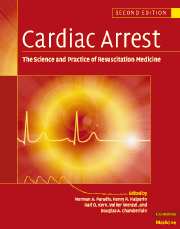Book contents
- Frontmatter
- Contents
- List of contributors
- Foreword
- Preface
- Part I Introduction
- 1 A history of cardiopulmonary resuscitation
- 2 The epidemiology of sudden death
- Part II Basic science
- Part III The pathophysiology of global ischemia and reperfusion
- Part IV Therapy of sudden death
- Part V Postresuscitation disease and its care
- Part VI Special resuscitation circumstances
- Part VII Special issues in resuscitation
- Index
2 - The epidemiology of sudden death
from Part I - Introduction
Published online by Cambridge University Press: 06 January 2010
- Frontmatter
- Contents
- List of contributors
- Foreword
- Preface
- Part I Introduction
- 1 A history of cardiopulmonary resuscitation
- 2 The epidemiology of sudden death
- Part II Basic science
- Part III The pathophysiology of global ischemia and reperfusion
- Part IV Therapy of sudden death
- Part V Postresuscitation disease and its care
- Part VI Special resuscitation circumstances
- Part VII Special issues in resuscitation
- Index
Summary
Epidemiology is the study of the distribution and determinants of health-related states or events in specified populations and the application of this study to the control of health problems. Although much has been learned from epidemiologic studies of cardiac arrest, this broad definition should be tempered by the recognition that death can be deferred but not prevented.
Epidemiology and the study of cardiac arrest
Much of what we understand today about the basic pathophysiology of cardiac arrest has been gained through observational rather than randomized studies of patients at risk for or in a state of cardiac arrest. This is only natural since sudden death is a relatively unpredictable event that usually occurs out-of-hospital and the victim is initially treated by emergency medical services providers, then transported to hospital for further triage and treatment in the emergency department. The epidemiologic study of cardiac arrest not only provides information about risk factors for the onset of arrest, the current status of treatment of the condition, but also suggests how to improve treatment and directs physicians toward future studies of resuscitation.
In broad terms, epidemiologic data are used to identify cellular (e.g., gene mutations that predispose to arrhythmias), environmental, social, educational, behavioral (e.g., activity level, smoking), clinical (e.g., atherosclerosis, reduced ventricular function, diabetes), or health system risk factors that predispose individuals to cardiac arrest or particular outcomes after its onset. By identifying risk factors that are amenable to modification, such as diet or smoking, physicians have attempted to improve survival through prevention.
- Type
- Chapter
- Information
- Cardiac ArrestThe Science and Practice of Resuscitation Medicine, pp. 26 - 48Publisher: Cambridge University PressPrint publication year: 2007
- 4
- Cited by

